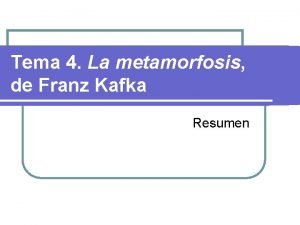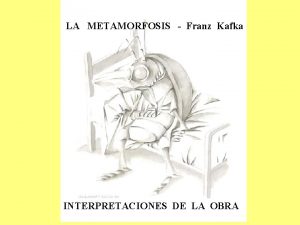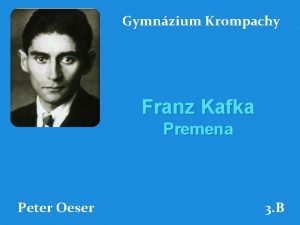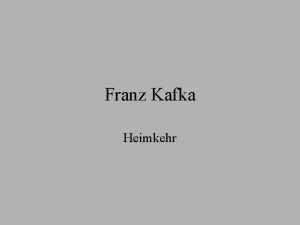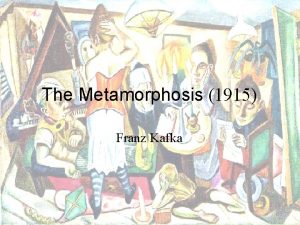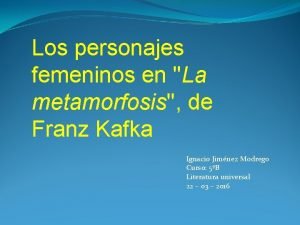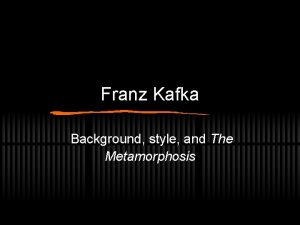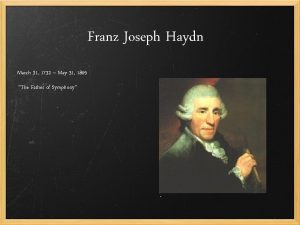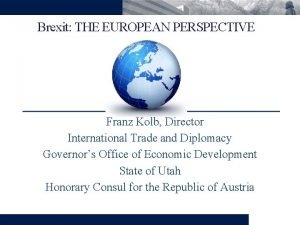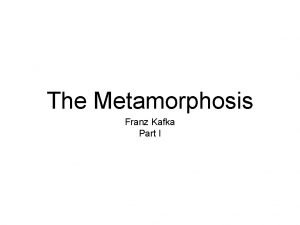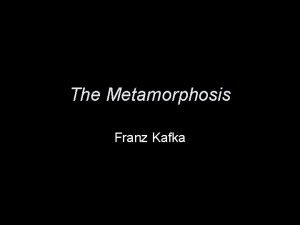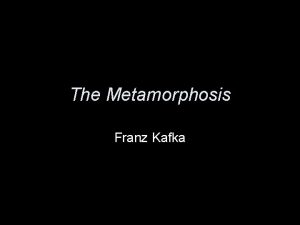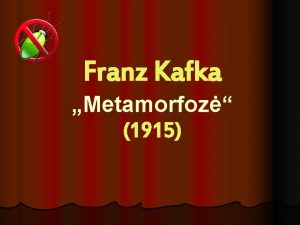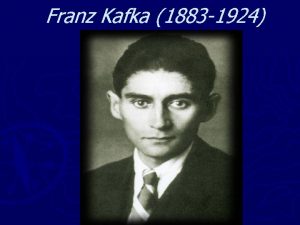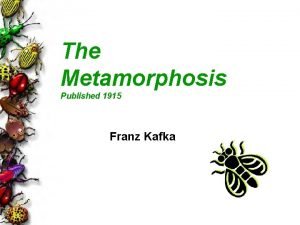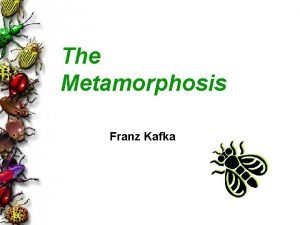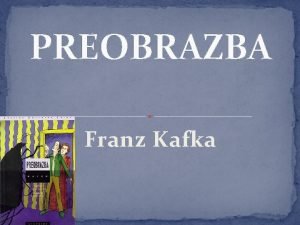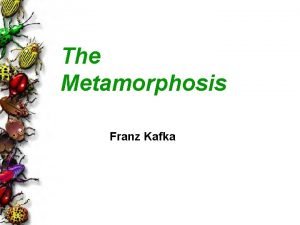Pavel Eisner Franz Kafka and Prague Kafka and











- Slides: 11

Pavel Eisner Franz Kafka and Prague

Kafka and Prague • Interpreters of Kafka are getting it wrong, they are ignorant of decisive facts: • “Kafka is explicable only in terms of his Prague, and thus only by means of an intimate knowledge of circumstances which are unique and will never recur again. ” (6) • Kafka’s work remains as a testimony to a “bygone world” (29) - but this can only be ascertained indirectly, by reading between the lines • “The foreign critics of Kafka lack any acquaintances with certain local facts and customs; so that it is no wonder that they fail to penetrate the whole complex” (7) • “I refer to things specifically Prague: concrete, atmospheric, psychological, and sociological. ” (7) • genius loci

Judaism • The fate of the Jews in the Diaspora - this is only partially true for Kafka • “Kafka does not embody the tragedy of the Western European Jew as such, but rather the tragedy of the German Jew in Prague. ” (13) [with emphasis on the adjective] • in this not only the place (Prague), but also the time (early 20 th century) is significant

Jews in Prague • Had always been closely tied to Czech culture • Like rest of Bohemia, were heavily impacted by the process of Germanization after White Mountain • Emancipation from ghetto —> integration into German culture • “The Germanized Jew abandoned the wall of his prison and attached himself to the Germans, spoke their language, took at first a passive and then a very active part in their cultural life. ” (16) • officially required to attend German schools • gravitated toward the “gleaming light of German culture” (18)

“German ghetto” • Czech national revival —> Czech culture once again dominated Prague, Germans returned to being a minority • “The Germans in Prague became a small enclave which, both within and without the walls, was cut off from the homogeneous Czech population and was separated from the Sudeten Germans who were in every respect very different. ” (19)

Germans/Czechs • “The German population in Prague, however, was never even in its prime, and organic and normal society. ” (19) • class of “rulers” - by rank or by wealth • no German hinterland • German population in Prague lived in “social Ghetto” isolated from broader (Czech) society • • this also affected their language and culture Jews had left the “religious” ghetto, but now belonged to a national and social ghetto

Germans/Czechs • “Sociologically, the Czechs were ideally healthy, having preserved a rich biological communication between capital, province, and peasantry, from which the springs of rejuvenescence flowed to Prague. They were a vigorous folk. ” (21 -22)

German Jews in Prague • Belonged to the “ruling class” - industrialists, businessmen, doctors, lawyers, professors, traders • Main contact with Czech culture was through servants and people in “inferior” positions • Completely ignored Czech culture. Went to German schools/unis, read German papers, went to German concerts, etc. [—>Kisch]

German Jews in Prague • Heavily involved in German Casino (cultural center) • At start of 20 th century, according to Eisner, 85% of “Germans” in Prague were Jewish [and “Germans” overall only accounted for 6 -10% of the population] • They voluntarily belonged to the “German ghetto”, which socially isolated itself from “the streets” of (Czech) Prague • “Czech Prague was a flowing river; the German Jew sat on the bank with his back turned” (31 -32)

Alienation and Death • They were also alienated from the Sudeten-Germans in the Bohemian countryside (they were primitive, while Jews aspired toward cultural and intellectual avant-garde) —> They were “Germans” who rejected German nationalism and in turn were rejected by these Germans • “Thus, the Prague German Jew remained aloof from everything Czech; on the other hand, the German, in the figure of a Sudeten German patriot, could only disgust him” (35) • “as if” existence: a “German” but alienated from and rejected by the national community (outside of Prague)

Alienation and Death • In the eyes of the Czechs, the German Jew was a stranger in three senses: as jew, either owing to creed or unmixed blood; as a generally comfortable, prosperous and, often enough, rich citizen, in the midst of a crowd of proletarians and small bourgeois; and thirdly as a “German… The Prague German Jew was precisely the embodiment of a completely foreign way of life. ” (36) • To Czechs, the Jew was “unqualifiedly a German, a stranger, an opponent and intruder, a national enemy” (32) He was “the people’s enemy without a people of his own. ” (37) • The Jew was an “exile in his own country” (37) • “Alienated from life, the Prague Jew linked himself with death” (32) • Themes of escape dominate German Jewish life and culture
 Resumen por capitulos de un grito desesperado
Resumen por capitulos de un grito desesperado Metamorfosis de franz kafka resumen
Metamorfosis de franz kafka resumen Interpretacion de la metamorfosis de franz kafka
Interpretacion de la metamorfosis de franz kafka Kafka premena
Kafka premena Heimkehr franz kafka
Heimkehr franz kafka Metamorfosis lugar donde se desarrolla
Metamorfosis lugar donde se desarrolla Franz kafka, “the metamorphosis” (1915)
Franz kafka, “the metamorphosis” (1915) La metamorfosis de franz kafka personajes
La metamorfosis de franz kafka personajes Kafka style
Kafka style Franz kafka lub joseph haydn
Franz kafka lub joseph haydn Franz kafka brexit
Franz kafka brexit Franz kafka
Franz kafka

